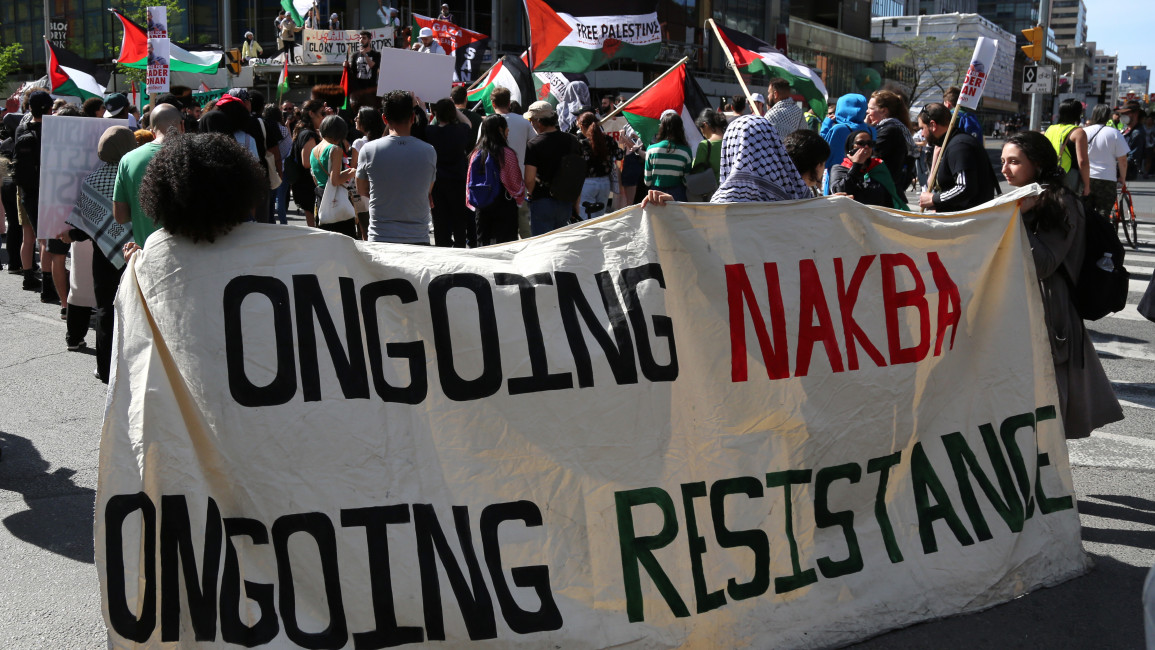
This Nakba Day, we must reflect on building collective power
75 years on from the Nakba, where hundreds of thousands of Palestinians were expelled from their homes during the creation of the state of Israel, we must insist on remembering.
Remembrance is a process that allows victims to understand their experience, find meaning, and express and represent this meaning - in spite of the forces who would seek to suppress their truths.
As Syrian intellectual Yassin al-Haj Saleh writes, such a process is important because it serves both a “communicative and social function.” Palestinians remember, express and represent - and therefore we remain united despite our fragmented realities. Palestinians remember, even as stronger forces try to silence the simple act of speaking.
So at 75 years of Nakba, we should remember our successes.
"From Land Day to the Unity Intifada, we continued to resist in the face of vicious repression and never-ending colonisation"
There have been many: in the face of insurmountable odds, we remained steadfast. We articulated our national claim over and over again. We organised and resisted across Palestine and in the Shatat (diaspora), repeatedly transcending our imposed fragmentation. From Land Day to the Unity Intifada, we continued to resist in the face of vicious repression and never-ending colonisation.
And we were victorious in many spaces. For instance, as Rashid Khalidi notes, today no serious historian engages in Nakba denialism; such discussions are relegated to only the most extreme fringes. Moreover, in public discourse, across a variety of contexts, we are winning the battle of narratives.
Despite many serious attempts to clamp down on expression, Palestinians are active in the media and in narrating our struggle directly. This is impacting public opinion at the very least, even if it has not yet drastically changed policy.
We have also won the battle of regenerating commitment to the Palestinian national identity. It is a testament to the success of the national movement that young Palestinians (particularly in the diaspora) have not forgotten. Indeed they have spaces to learn about and express their identities in a way that was unimaginable even 10 years ago.
This is in no small part thanks to the Palestinian elders who came before us, and toiled to make those spaces under extremely hostile conditions - including political repression, backlash, forced exile, and even assassination.
But there are also limitations to remembrance. For one, which Nakba are we remembering? The “75th” commemoration of the Nakba betrays our understanding of it - a Nakba that perhaps had its most crushing episode in 1948, but did not start there. And, importantly, a Nakba that did not end there.
As many have pointed out, the Nakba is a process that is ongoing. We are in fact witnessing serious discussions of another savage stage of that Nakba, with Israel’s new extremists in power, as we speak.
Given this context, how can we capitalise on this remembrance to go beyond communicative and social functions – to serve as an impetus for generative reflection and capacity building?
On this 75th anniversary of the Nakba, perhaps then we should also remember where we were less successful, so that we may translate the hard-fought gains we have made into actual power. Because, despite a great deal of resistance and effort, we still have not sufficiently translated this energy into building power within historic Palestine and beyond.
Thus I would argue we should take this date as an opportunity to self-reflect on two persistent issues.
First, we should interrogate the moments in our recent history where we have failed to be in solidarity with other victims, so that we may build transnational power more effectively. It is true that Palestinians have made significant inroads with a number of global struggles, including the African American, Native American, and South African communities. But, we can do more to engage effectively with causes close to home.
The fact that showing solidarity with our Syrian, Iraqi, and Iranian brothers and sisters in their fight against authoritarianism is now seen – in some circles – as a non-issue at worst or a divisive burden at best is a testament to how we have failed.
"Reflecting on these challenges would allow us not only to build power and shift our material reality, but also engage in a truly liberatory project – one that recognizes no one is free until we are all free"
Moreover, we have not expended adequate energy in linking with other occupied and colonised peoples, inside and outside the Arab world – whether in Western Sahara, Kashmir, or Ukraine.
In my view, we miss a crucial opportunity when we do not link the Palestinian cause to anti-authoritarian struggle everywhere.
As a result, we forego the possibility of strategizing with other communities facing similar repression under varying regimes, and thus battling these forces as a united front. This is crucial as Palestinians in historic Palestine struggle against layers of authoritarianism, from colonial violence to the Palestinian Authority’s corruption.
Authoritarian actors are very direct and strategic about building capacity together, as the Abraham Accords show very clearly. But we Palestinians have not been strategic enough about doing the same.
We have not engaged with other struggles in order to build shared capacity as much as we should. Indeed, the spectre of parochialism is ever present in many of our organising spaces – and this has greatly hindered our ability to build power.
For years, Israel has relied on its policy of 'targeted killings' to sanction extrajudicial killings and bombing of family homes in Gaza by deliberately misinterpreting international law to strip Palestinians of protections, writes @benabyad👇 https://t.co/UjkbMjVO0w
— The New Arab (@The_NewArab) May 14, 2023
Secondly, we should reflect critically on the instances in our past where we have turned against each other – those moments where infighting has hindered our ability to formulate shared objectives and strategies.
A traumatised society, faced with intentional strategies of physical and ideological fragmentation, will undoubtedly lack trust. It is not surprising when members of that society are hypervigilant, aggrieved, and insular. Such a society – especially one where the trauma never ceases – in turn becomes quick to scapegoat.
We have seen a number of examples in the past few years of people’s efforts expended towards policing their fellow Palestinians, rather than working together.
Whether it's targeting queer Palestinians, Palestinian women, or whatever group commits the crime of self-critique, scapegoating and casting aspersions has become all too common. Those who engage in such scapegoating are tolerated among us, sometimes even elevated.
I would thus argue that to make this occasion for remembrance truly meaningful, we must use it as an impetus to think strategically about how to rebuild trust and overcome fragmentation in the national movement.
As Palestinian writer and activist Amjad Iraqi put it, we have wasted far too much energy “cannibalising” each other, imposing litmus tests, and ignoring intersectionality. Let us instead take this occasion to reflect, and begin building the “broad tent movement” for Palestinians and their allies.
Broadening our movement would provide space for a wide variety of ideas and help leverage all the tools at our disposal. Thus, reflecting on these challenges would allow us not only to build power and shift our material reality, but also engage in a truly liberatory project – one that recognizes no one is free until we are all free.
There is an urgency to this. The Nakba is accelerating and we are facing an existential threat. So on this 75th anniversary of the Nakba, we must remember and reflect with a purpose. Otherwise, if we are not quick to learn these lessons, the act of remembrance may become a moot point.
Dr Dana El Kurd is an Assistant Professor of Political Science at the University of Richmond. She is the author of "Polarized and Demobilized: Legacies of Authoritarianism in Palestine" (Oxford University Press, 2020).
Follow her on Twitter: @danaelkurd
Have questions or comments? Email us at: editorial-english@newarab.com
Opinions expressed here are the author's own and do not necessarily reflect those of The New Arab and its editorial board or staff.



